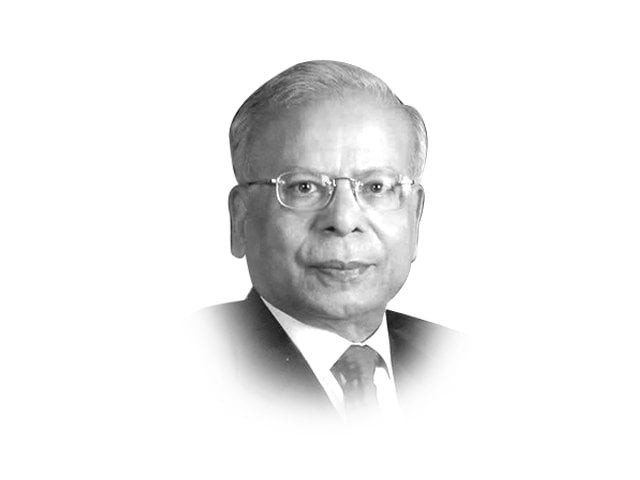Coping with an uncertain future
Pakistan has already been marginalised in international markets and its share has been gradually declining

The writer is former Governor SBP and currently a Public Policy Fellow at Woodrow Wilson Center, Washington, DC
In the US, the citadel of open economy and economic freedom — which has consistently lectured and persuaded developing countries for the last six decades on the virtues of free markets for the exchange of goods and services, ideas and technology, capital and talented manpower — Donald Trump, a leading proponent of the opposing philosophy, has won the primaries and emerged as the presumptive candidate of one of the two leading political parties — the Republican Party. The anger, anxiety and fear of job losses, economic insecurity and an unpredictable future are propelling more and more members of majority communities into a tailspin. The stark income inequalities whereby one per cent of the top income group and several hundred billionaires control as much income and wealth as several hundred million people belonging to the low-income groups, who are opting out of the labour force as they are unemployable, has added fuel to the fire. The blame for this is placed on the growing influence of China and other Asian countries while empirical research shows that it is the technology and substitution of labour by automation and skills that is responsible for this outcome. But popular perceptions exploited by right-wing political leaders are aimed against trade, migration and financial integration. The catastrophic fallout of Brexit in the form of a steep plunge in share prices in the global stock markets, a sharp depreciation of the British pound and tumultuous disorder in European countries were of no consequence to these leaders. Boris Johnson claimed the referendum day to be the day of independence for the UK, Donald Trump hailed that “they took back their country” and Marine Le Penn called for an EU exit referendum for France. The fact that the markets would remain jittery, the economic conditions would get worse and the lives of ordinary citizens, particularly the poor, and the unemployed would become unbearable because of prolonged recession does not cut any ice with them.
Pakistan has already been marginalised in international markets and its share has been gradually declining over the last two decades. Our neighbours in the region took full advantage of the buoyant world economy and increased their market shares at our expense because of their sensible and supportive economic policies. There was some hope that as we come out of the stabilisation phase and move towards structural reforms, to reignite a sustained growth policy, attention would be paid to removing anti-export bias by changing taxation and the regulatory environment, increasing ease of doing business, and reducing cost of production and distribution, but the external environment is becoming relatively hostile. The looming recession in the UK and the EU followed by the US would further damage Pakistan’s prospects as these are the traditional markets to which Pakistan ships its goods and sells services. Our welcome entry in the Emerging Market Index of the MSCI would not, for the time being, result in the flow of expected portfolio investment from institutional investors as they opt for flight to safety i.e., the US market. Diversion of these flows from the rest of the world would strengthen the US dollar despite very low returns hurting its exports and slowing down its economic growth. As the Pakistani rupee is implicitly tied to the US dollar, the symbiotic appreciation of the rupee would further aggravate the balance of payments situation. Foreign flows and assistance that were filling in the current account deficit and boosting our foreign exchange reserves would become hard to attain.
At the global level, the uncertainty, volatility and turbulence in the markets can be tackled by the collective and coordinated efforts of policymakers, particularly of the G7 countries. The post-2008 crisis was effectively contained by the joint efforts of these countries. The relaxation of monetary policy by central banks in a concerted manner, followed by quantitative easing and negative interest rates, were able to limit the widespread damage and revive the global economy to some extent. Fiscal stimulus in China and other countries complemented the monetary policy. China and emerging countries made three-fourths of the contribution to world economic growth in this period. However, the situation in 2016 is worrisome. China’s economy is going through a transition from export-led growth towards boosting domestic demand and therefore trade surpluses are no longer available for capital recycling and lowering of prices for consumer purchases in the US and the EU. Oil and commodity exporting countries are facing substantial income losses. The central banks of the EU, Japan and the US have almost exhausted all the ammunition in their armoury and have very few policy levers to pull. High debt ratios in China, Japan and other OECD countries do not provide adequate space for any further fiscal stimulus.
Under such a constrained global environment, choices for Pakistan’s economic future have become much tougher. We should not hesitate but redouble our efforts in implementing the agenda for basic structural reforms and seek consensus of all political parties on the contours of this agenda. Greater coordination among the different federal ministries and agencies, and federal and provincial governments, quick decision-making and active implementation, better communication and information provision to the public at large and consultations with the private sector and businesses during the prosecution of these reforms should help us in coping with these challenges.
Published in The Express Tribune, June 29th, 2016.
Like Opinion & Editorial on Facebook, follow @ETOpEd on Twitter to receive all updates on all our daily pieces.















COMMENTS
Comments are moderated and generally will be posted if they are on-topic and not abusive.
For more information, please see our Comments FAQ